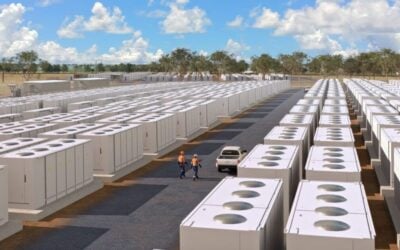Mercedes-Benz Energy on display at this year's Intersolar Europe show. Image: Andy Colthorpe.
Energy storage systems from Mercedes-Benz will be supplied with batteries manufactured at an expanded plant in Germany which the company has just announced, but has declined to reveal the production capacity.
The business division, Mercedes-Benz Energy, is already marketing its energy storage systems in Germany, including so-called “2nd life” systems which repurpose EV batteries for home use. Parent company Daimler said this week that it will invest around €500 million (US$546 million) into a battery production facility through its subsidiary, ACCUMOTIVE. This will be part of an overall strategy to invest around €1 billion into battery production globally.
Enjoy 12 months of exclusive analysis
- Regular insight and analysis of the industry’s biggest developments
- In-depth interviews with the industry’s leading figures
- Annual digital subscription to the PV Tech Power journal
- Discounts on Solar Media’s portfolio of events, in-person and virtual
The group will have 10 different models of EV available by 2025, and will add 20 hectares of new battery production capability at its existing battery plant in Kamenz, near Dresden. Construction on the “CO2 neutral” lithium-ion battery plant is set to begin in 2018.
Battery workforce to double by 2020
ACCUMOTIVE managing director Frank Blome was quoted as saying that from around 400 employees today, the company will double its workforce by 2020. In comments made on a Daimler corporate video Blome said ACCUMOTIVE’s track record with car batteries made it suitable for stationary applications too.
“The vehicle batteries do have a very robust technology, high quality, high safety and that is also important for stationary batteries and with that it was also a consequent step into the future to also develop, produce and sell stationary batteries,” Blome said.
Brands benefitting from the expanded facility will include a new EV range, EQ, which is expected to launch a 500km-range SUV model “within this decade” according to Daimler, as well as electrified Mercedes-Benz cars and the smart branded cars. The stationary storage range meanwhile premiered in June this year.
The stationary storage range includes "2nd life" EV batteries. Image: Andy Colthorpe.
Company tight-lipped on production capacity details
Tesla has been keen to let the world know exactly how big its Gigafactory in Nevada will be when finished, supplying the US maker’s stationary storage and EV batteries and reaching 50GWh of production capacity by 2020. Equating to 500,000 battery packs, it will be roughly equivalent to the current world lithium-ion battery production capacity.
Daimler told Energy-Storage.News that the company does not generally comment on production capacity figures for its facilities. However spokeswoman Elisa Pee said that: “All signs point to consistent growth, as the company expects increasing production figures of battery systems for automotive applications as well as stationary battery storage.”
Similarly, Pee said Daimler was not willing to go into detail on what sort of proportion of production at the Kamenz facility will be dedicated to stationary energy storage systems but instead offered a statement on the potential the group sees in the technology.
“The business segment of stationary energy storage is a growth market. And it is developing very fast,” citing the establishment of Mercedes-Benz Energy GmbH in June 2016 as a quick move to an “important step in the expansion of the business”.
Pee said Mercedes-Benz Energy is now looking at expansion into international markets and forming partnerships within the industry.
“We receive inquiries from all over the world we are very pleased with the demand,” Pee said.






